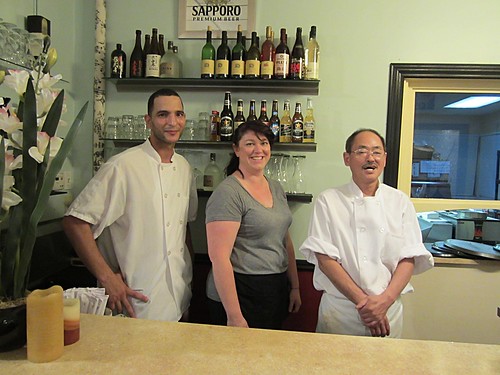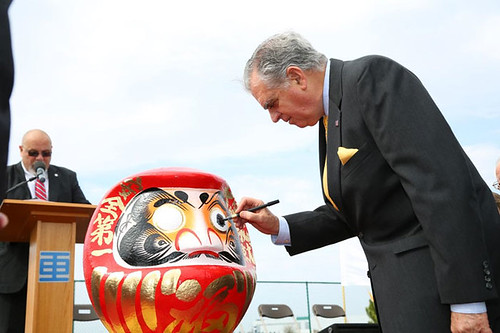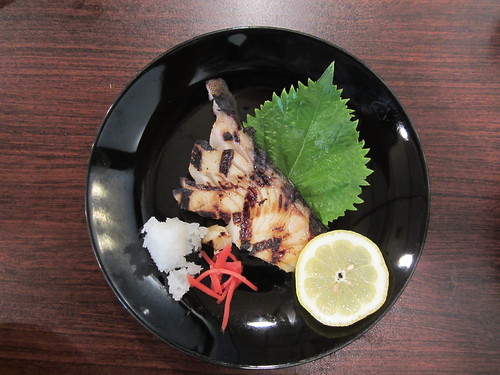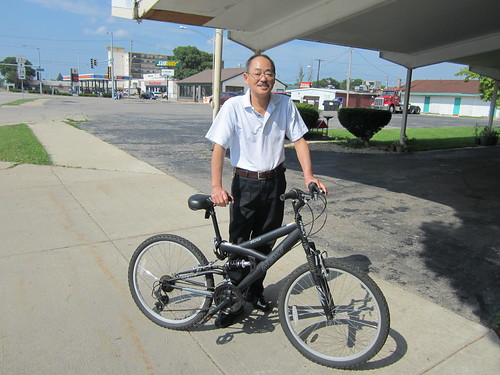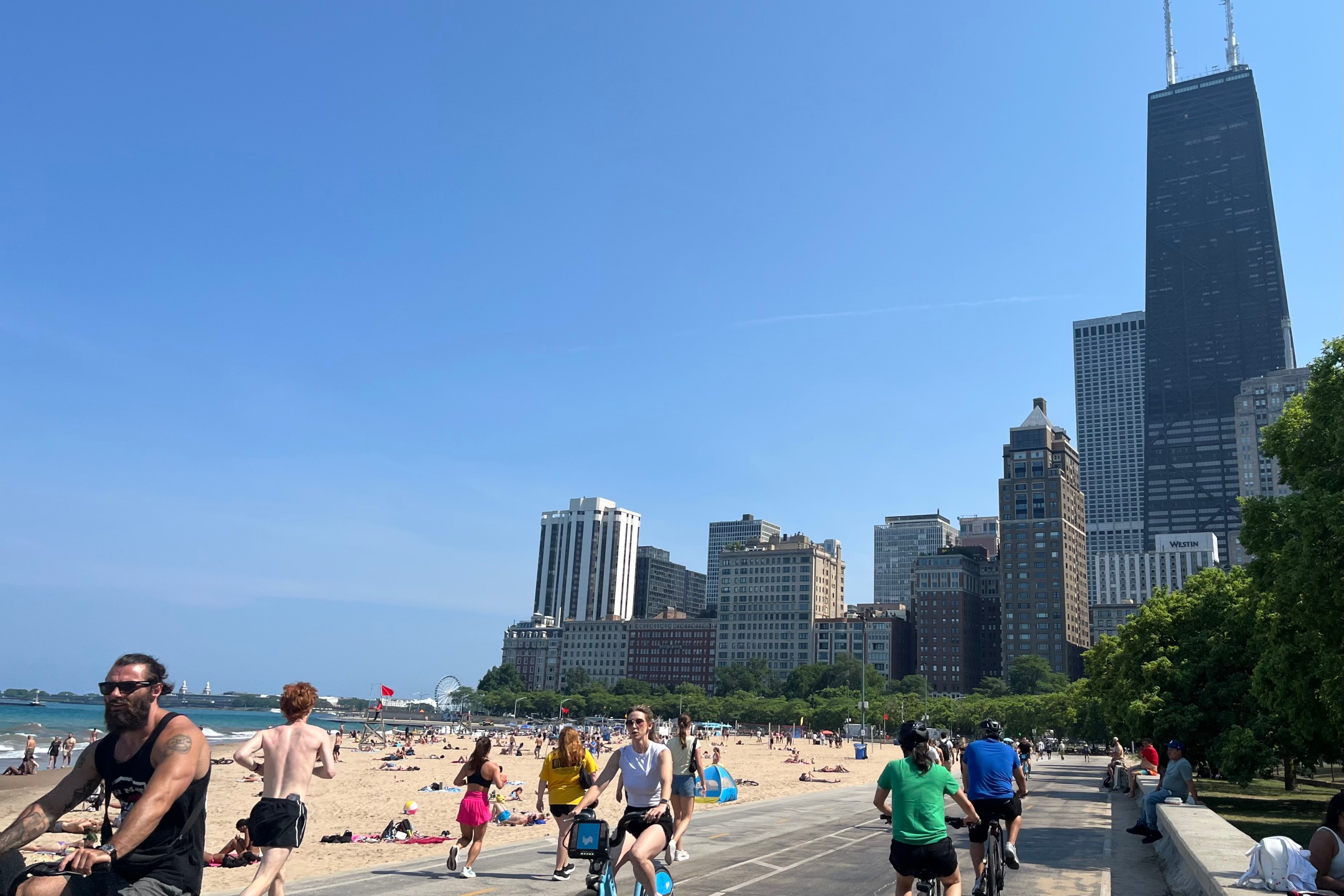Sometimes transportation and food intersect in curious ways. The northwest Chicago suburbs of Arlington Heights, Mount Prospect, and Elk Grove Village are home to the region’s largest Japanese expat community. I was bummed to find out that Mount Prospect’s Torishin, my favorite izakaya (Japanese pub-eatery) recently shut its doors. The tavern was a popular place for local salarymen to hang out after work over drinks and delectable bar snacks.
However, I was intrigued to learn that Torishin had folded because chef Toshiro “Tony” Koneko had moved to rural Rochelle, Illinois, to cook at Yoshino, a new restaurant catering to Japanese employees at the Nippon Sharyo railcar plant. The factory is building cars for upcoming high-speed passenger rail service between St. Louis, Chicago and Detroit.
Nippon Sharyo marketing manager Ken Kuriyama explained how this interesting culinary state of affairs came to be. For several years the Nagoya-based company’s Midwest engineering and marketing headquarters has been located in Arlington Heights, across the street from Mitsuwa Marketplace Japanese shopping center. Employees from the firm regularly ate lunch at Torishin, Kuriyama said.
In 2012, after winning a $585 million contract to produce 160 “Highliner” railcars for Metra Electric Line service, the company opened an assembly plant in Rochelle in order to comply with the Federal Transit Administration’s “Buy America” requirements. These mandate that 60 percent of all parts for the rolling stock be of U.S. origin, and the railcars must be assembled in the U.S. Kuriyama said his company chose Rochelle because two major rail lines, the Union Pacific and the BNSF, intersect there, which, along with the presence of several major highways, give the town its nickname, “The Hub City.” That $35 million plant created an estimated 250 jobs.
Nippon Sharyo recently snagged a $352 million federal contract, managed by the Illinois Department of Transportation, to make 130 bi-level cars for 110 mile-per-hour high-speed passenger rail service in California, Washington State, and between the three Midwest cities. 88 of the cars will operate in Missouri, Illinois and Michigan. Amtrak hopes to offer high-speed service on at least three-fourths of the Chicago-to-St. Louis route, the stretch between Dwight and Alton, by 2015.
Since the high-speed railcar contract is funded by the Federal Railroad Administration, which has a 100 percent Buy America requirement, this year the Japanese company built a $54-million, 327,360-square-foot expansion to the Rochelle plant for metal fabrication and machining production, Kuriyama said. The new facility should begin operations next spring, and it’s expected to create 80 more fabrication jobs.
A groundbreaking ceremony for the expansion in April included then-U.S. Secretary of Transportation Ray LaHood, Governor Pat Quinn, and Nippon Sharyo Chairman Katsuyuki Ikushima. Although some have argued that Buy America requirements have been an impediment to expanding american rail, LaHood heralded the facility as a success story. “[The expansion] means more manufacturing jobs for Illinois, and is proof that our Buy America program, requiring every rail component to be built in the U.S. by American workers, is making a difference,” he said.
To mark the occasion, the men used a marker to fill in one of the blank eyes of a large, red, spherical Daruma doll, representing the founder of Zen Buddhism. Traditionally, you fill in one eye when you begin an endeavor, and fill in the other once the goal is achieved. Presumably, the other eye will get its pupil during the ribbon cutting for the new plant.
Kuriyama said about 20 Japanese technical supervisors are permanently based in Rochelle, another 20 go back and forth between Illinois and Japan, and more will be stationed here once the new factory opens. Frank Mochizuki, a senior advisor at Nippon Sharyo, had the idea of persuading Tony Koneko to move to Rochelle to cook for the expats. “They asked me, ‘Tony, you want to go over there?’” Koneko told me. “I said no, too far.” However when the company proposed paying him a good salary and benefits, he said it was an offer he couldn’t refuse.
Yoshino co-owner and sous-chef Ned Abdallah said that Nippon Sharyo’s offer to pay Koneko’s salary took away some of the risk of introducing a new cuisine to a small town. “That’s a nice incentive to open up a Japanese restaurant, when you’re getting a free cook,” he said. “And Tony’s a professional—it’s not just anybody.” Another carrot was the built-in business from the railcar factory. Yoshino is only open for dinner; during the day the cooks prepare a rotating lineup of bento box lunches, which they deliver to the plant.
I talked a buddy into making a pilgrimage to Rochelle a few Saturdays ago to check out Yoshino and the Nippon Sharyo plant, which is unfortunately closed on weekends. We rode Metra’s Union Pacific-West line with our bikes to Elburn, a little town west of Geneva. From there it was a thirty-five-mile pedal under sapphire skies past cornfields, wind farms and an orchard featuring Shizuka apples, a sweet Japanese variety. Our route, which included a few miles of gravel, is posted here. On the outskirts of town we stopped to gaze at the massive railcar facility, which had a couple of bi-level cars parked outside.
While we were checking into a cheap motel near the restaurant, by coincidence, Koneko, a sprightly sixty-two-year-old, rolled up on a bike on his way to work. He was surprised and delighted that we’d followed him to Rochelle to check out Yoshino.
That evening my I friend and I held court in a corner table of the charming little restaurant for several hours, sipping sake, observing the crowd, chatting with our knowledgeable waitress Jaclyn Thomson, and nibbling on an endless stream of Koneko’s Japanese tapas, which were just as interesting and tasty as they were at Torishin.
When Koneko emerged from the kitchen at the end of the night, he seemed much more relaxed. Business had been brisk and he sounded optimistic about his future selling authentic Japanese cuisine in a blue-collar factory town. “We don’t make big money but we are doing good,” he said. “It’s not Americanized, it’s Japanese.”
Kuriyama said the expats at Nippon Sharyo are grateful the chef moved to town. “Some of our employees really missed Japanese food, so they were very happy to have the restaurant open,” he said. “The food is really important. It energizes us.”
Read a less transportation-focused, more food-centric account of John’s journey to Rochelle, as well as a bike excursion to visit the ramen shop that replaced Torishin, in Newcity magazine.
